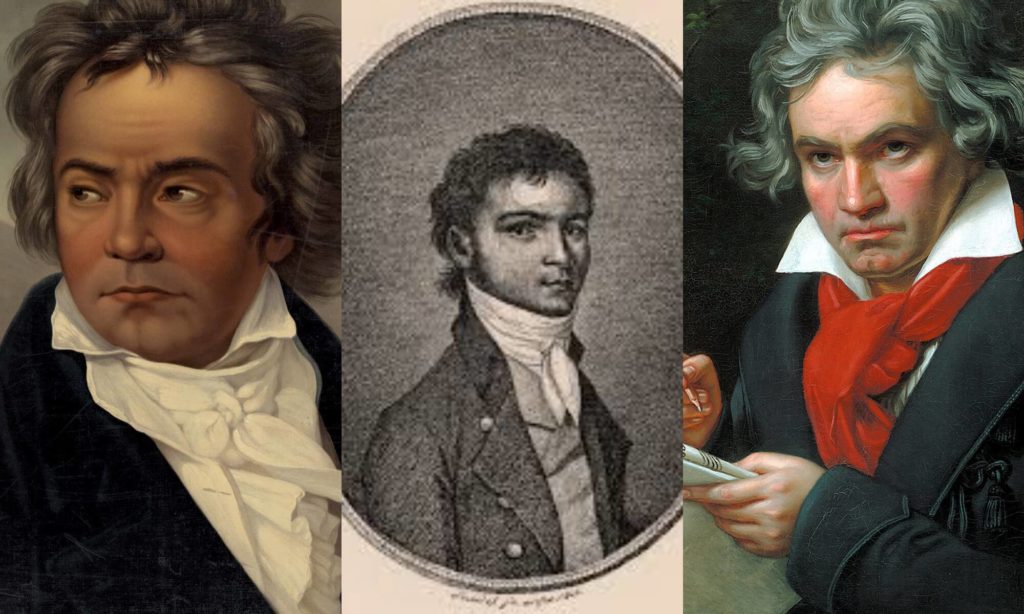Thanks to a circulated screenshot from the website The Concordian, Twitter has been abuzz since Wednesday night with the idea that classical German composer and pianist Ludwig van Beethoven was actually a black man. So now it totally makes sense why “Symphony No. 5” bangs so hard.
The Concordian article dates back to 2015, and it states that the genius composer of the Romantic Period of music (most prominent in Europe around the 1800s) was the son of Johann Van, a white German man, and Maria Magdalena Keverich, a likely Moorish woman. The Moorish people were dark-skinned Muslims who took ownership of what was then the Spanish Netherlands for around 700 years, and Beethoven’s mother was born in and resided within Moorish territory.
https://t.co/onhd3gZjCC pic.twitter.com/loOUa9MX7N
— Alyssa (@howtopless) June 16, 2020
As we know, history tends to whitewash, and since this era is hella old, there weren’t DNA tests or photographs to validate Beethoven’s race. However, the article lists physical descriptions of Beethoven from “various credible sources,” such as “his lovers, students, teachers, anthropologists, historians, and authors.” These descriptions include a “brownish complexion,” a “flat, thick nose,” and “coal-black hair…stood up around his head.”
Additionally (because my interest is piqued and my research-nerd hat is strapped on), it’s been suggested through sources such as the website Black History that Beethoven may have been pressured into putting powder on his face to appear white to the masses.
Well, I’ll be.
https://twitter.com/reece_mcdermott/status/1273505090285035522
However, a 2013 article “Black Beethoven and the Racial Politics of Music History” says that there was absolutely no way to believe Beethoven was a black man given the evidence, and that we’d have to reimagine the entire landscape and history of Western music if so.
“This desperation, this need to paint Beethoven black against all historical likelihood is, I think, a profound signal that the time has finally come to make a single … and robust effort [to reshape] the classical canon,” he writes. What a fucking killjoy.
Well, we’ll never truly know for sure what Beethoven’s genetic makeup was. The Root Editor-in-Chief Danielle Belton tells me that this debate has popped up several times since she’s been alive, so I’m sure this will be brought up again by 2030. However, this could definitely spark an interest in classical music among our community’s younger members if so.
As expected, Twitter came through with hilarious reactions. Take a look at some of our favorites below.
https://twitter.com/boltzmemes/status/1273647370299981826
Nobody:
Beethoven in the 1800s: pic.twitter.com/iXKQN0UEQE
— ???? (@JuiceKing5x) June 18, 2020
I was today years old when I found out that Beethoven was black
— zel (@denzeldion) June 18, 2020
https://twitter.com/liluzivurtmemes/status/1273640355422973952
Beethoven was a black brother? This is me rn https://t.co/UAMzwLNsbN
— Bad Guy (@ZairianKing) June 18, 2020
Beethoven was black? pic.twitter.com/EG5HoV1uqr
— A Girl Has No Name (@_cherieldn) June 18, 2020
I get this "Beethoven was black" idea is generally non-serious banter, but why waste all that effort to promote a silly conspiracy when you could instead be celebrating *ACTUAL* black contemporary composers like Saint-Georges, Johnson or Bridgetower who were phenomenal musicians? pic.twitter.com/oxUellCBjB
— Mr. Singh (@Chindiazindabad) June 18, 2020
Beethoven was black. 100,000 likes. https://t.co/g7WhcMbR5x
— Paul Joseph Watson (@PrisonPlanet) June 18, 2020
Beethoven was black? Biz Markie's been trying to tell us this for 30 years.#Beethoven pic.twitter.com/w8fgxcswL0
— Ellis D Trippman, High Priest of The $@taN1C ELit3 (@ellisdtrippman) June 18, 2020



Comments are closed.